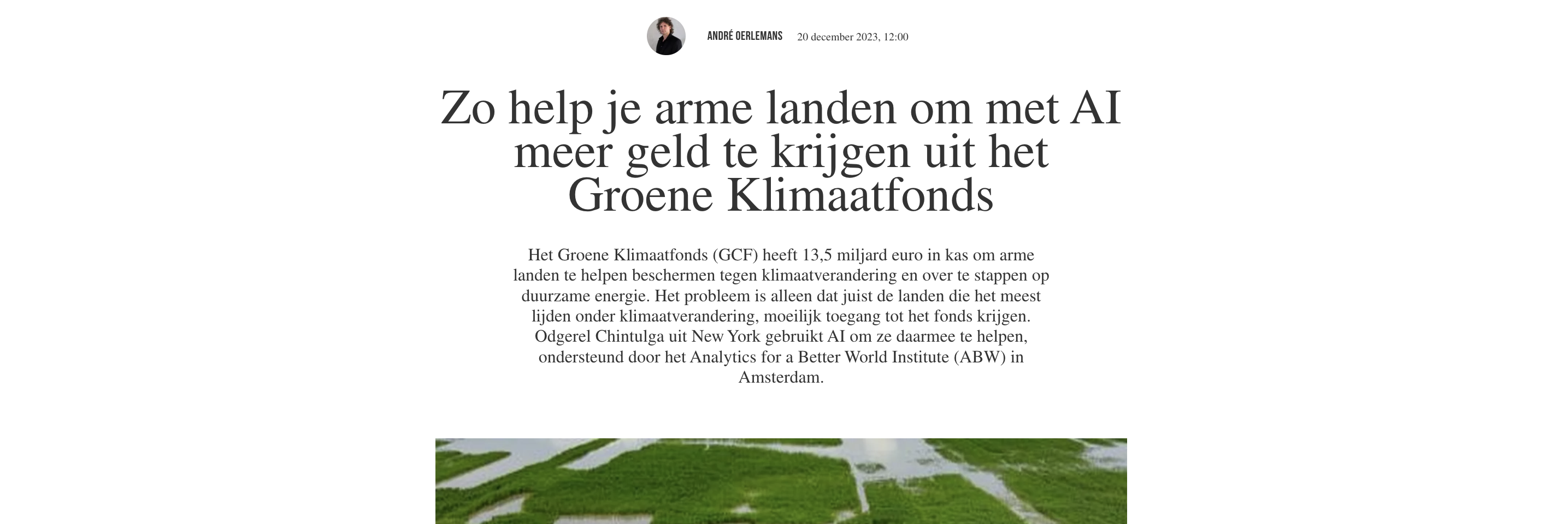
ABW 2023 Fellowship Impact on Change.Inc: How you help poor countries to get more from the Green Climate Fund with AI
On December 20th, 2023, an interesting article written by André Oerlemans was shared on Change.Inc about one of the projects developed during the ABW 2023 Fellowship Program. The project, developed by Odgerel Chintulga aimed at applying AI to help poor countries to secure more funds from the Green Climate Fund.
The full article can be found here: https://www.change.inc/finance/zo-help-je-arme-landen-om-met-ai-meer-geld-te-krijgen-uit-het-groene-klimaatfonds-40672 and we decided to translate it in English for our international audience!
Title: How to Help Poor Countries Use AI to Secure More Funds from the Green Climate Fund
The Green Climate Fund (GCF) has 13.5 billion euros to assist impoverished countries in safeguarding against climate change and transitioning to sustainable energy. However, the challenge lies in the fact that the countries most affected by climate change struggle to access these funds. Odgerel Chintulga from New York is utilizing AI, supported by the Analytics for a Better World Institute (ABW) in Amsterdam, to address this issue.
Green Climate Fund (GCF)
The GCF, established in 2010 by 194 countries, is the world’s largest climate fund. With 13.5 billion dollars contributed by member nations, it finances 243 projects in 129 countries. These funds help the poorest countries and small island states reduce greenhouse gas emissions, invest in clean energy, and enhance resilience against climate disasters and rising sea levels.
Challenges Faced by Vulnerable Countries
Despite its noble objectives, Small Island Developing States (SIDS) and the Least Developed Countries (LDC) find it challenging to secure funds from the GCF. Approval of applications often takes one to two years, and in 2020, only 12% of the fund’s financing went to these nations, falling short of the targeted 50%. Chintulga aims to bridge this gap by leveraging AI and data analytics.
Data Analysis Assistance
Chintulga, a senior associate at the Rocky Mountains Institute in New York, assists developing countries and small island states in obtaining financing for climate investments. Collaborating with the ABW Institute in Amsterdam during her free time, she is developing a method to help countries submit successful proposals to the GCF.
Research Approach
Chintulga initially examined the GCF’s project proposal criteria and studied successful and unsuccessful applications from the poorest countries and island states. Employing Large Language Models (LLMs) and the AI tool ChatGPT, she analyzed the commonalities among successful proposals to develop a comprehensive method for these countries to submit project proposals efficiently.
Testing and Future Plans
The model is currently undergoing further testing, including trials in poorer countries. Chintulga envisions creating a standardized digital application process that all countries can use, ultimately increasing the chances of approval for their proposals.
Accessible Technology for Success
Chintulga emphasizes the use of technology accessible to everyone to bridge the technological gap between developing and wealthier countries. By teaching people how to use Large Language Models effectively, she believes they can write their proposals more quickly with a higher chance of success.
ABW Institute’s Role
The ABW Institute, an initiative by the Amsterdam Business School, ORTEC (an analytics and technology company), and Professor Dimitris Bertsimas of MIT, aims to address global issues like climate change, hunger, disease, poverty, deforestation, and biodiversity loss through improved data and analytics.
Training and Mentorship
The ABW Institute provided training to a hundred individuals from 55 non-profit organizations, including Chintulga, to find data-driven solutions to various issues. Chintulga credits her mentor, data scientist Wouter van Gils, for the key role he played in developing her project.